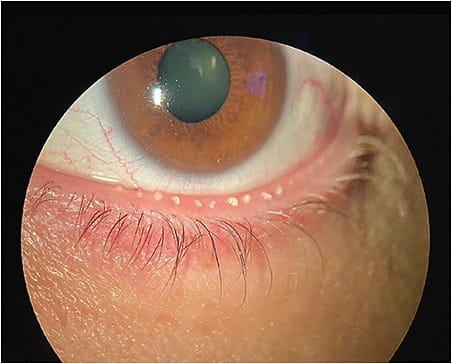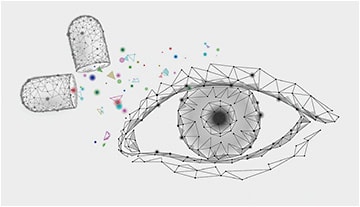In eye care, we have seen positive results from ocular nutritional supplementation in ocular surface disease (OSD),1-3 age-related macular degeneration (AMD),4 cataracts,5 and optic nerve health.5 (For additional articles on supplementation, see “Further reading on supplements,” p.46.)
However, no matter how well we educate our patients in the exam lane, once they leave our office to get their nutraceuticals we lose control over what patients actually purchase. If we cannot ensure supplements are provided to the patients who would benefit from them, then it hinders our ability to provide the best care. This is why dispensing nutritional supplements can be such a boon to both your practice and patients, and something that I think is a good fit for any optometrist helping patients manage conditions such as AMD, OSD, and glaucoma.
This article discusses the value of dispensing supplements, how staff can help in collecting patient information to inform supplement recommendations, and how I discuss supplements with patients and educate them on their benefits.
Benefits of dispensing
Once supplements and their benefits are properly discussed with patients, we find patient buy-in to be simple, as they provide an easy way to start or enhance therapy.
However, a treatment is not effective if it doesn’t even get into the hands of the patient. Before we began offering supplements in our practice, our success rate for getting patients to purchase and use nutraceuticals was low. Previously, when I would make the recommendation to patients, my staff would provide them with a handout explaining how to go online and order the product, as well as a coupon. Less than 5% of patients would order the product.
When we began offering the products for sale in the office, with the same exact presentation, that number jumped up to 60%. This subsequently gave us more confidence in making the recommendation, as we had about half of patients on supplements experiencing noticeable improvement in their symptoms in as little as 1 month.
Because supplements do not need a prescription, my office does not have to contend with prior authorization or jump through other hoops; there is no pharmacy involved, and the patient does not have to expend any effort to get it. They can leave with the product that day and start taking it immediately.
The integral role of staff
Our staff members are integral to “fact finding” with patients, to learn about the symptoms that are affecting them. Family history is one of the main risk factors for many ocular conditions, such as AMD, and staff can be very helpful in collecting that data from patients. They can also assist with administering any written tests, such as the Standard Patient Evaluation of Eye Dryness (SPEED) questionnaire for our OSD patients.
This lays the groundwork for the later discussion about supplements, letting patients know that, of course, we are going to talk about their glasses and contact lenses, but we are also going to have a conversation about the other symptoms and how we can improve them. When it comes to support on the back end after my recommendation, my staff can answer any questions about the supplements or anything else that was discussed. Patients get a lot of information during the exam, so many times they need clarification on the supplements. My staff can answer questions regarding dosing, expectations, and the importance of using the recommended nutraceutical as opposed to shopping around for alternatives. They have the authority and are empowered to answer those questions.

Patient discussion
I choose not to display supplements in the office; rather, I verbally introduce it to patients based on the information obtained from a comprehensive workup, including the clinical exam, their symptoms, and ultimate diagnosis. For supplements related to AMD optic nerve health, we use fundus photography and optical coherence tomography (OCT) to show drusen and other pathology. I often use images (see picture above) to explain why I am recommending a specific supplement to address their condition.
At that time, I educate them as to the formulation, how it works, and how it can benefit them. My script is the same whether we are talking about ocular surface disease, AMD, or optic nerve health: I describe the problem that I have diagnosed and explain that the ocular nutritional supplement is specially formulated to address their specific condition. I discuss how it works, how it is dosed, and how they should take it.
For instance, when speaking with an AMD patient I might say something like: “Ms. Jones, while we are treating you for AMD, you have the option of buying a nutritional supplement containing zinc. Studies have shown that taking zinc reduces the risk of developing advanced AMD,4 and this could be an easy way to enhance your treatment.”
As the experts, we have access to the latest science and clinical trial results plus our own experience, so we understand the scientific evidence behind the available products. This makes it imperative that we not only recommend the best product for the patient’s condition, but also do what we can to ensure the patient receives that product and, of course, takes that product as directed.
I let them know that although the supplement is not a prescription product, there are only a few places they can be purchased: our office, direct from the manufacturer, or, depending on the brand, from Amazon. My staff and I let them know what it costs and explain that they can buy the first bottle in our office. We follow up with AMD patients in 6 months, and 1 month for OSD patients. At this visit, any improvement is seen as ahead of schedule, but we routinely have patients who can tell a marked improvement in symptoms after 30 days.
When I see them back, I check their progress and make sure they are not having any issues taking the supplement as directed, and I encourage them by thanking them for sticking with it. I let them know what the next steps in their treatment and what more we can do for their condition. Supplements are an easy way to start therapy because most patients understand supplements, and with our help, they better understand the disease process. Even those who object to taking a prescription drug or “medicine” do not mind taking supplements. This gives us another avenue for treatment, so we can improve their lives sometimes without going down a prescription route.
Sometimes patients will tell me that they already take a supplement recommended by a friend, family member, or even a pharmacist from behind the counter. I never want to discredit anyone for taking advice from their trusted sources; however, I use that opportunity to educate on why the nutraceutical we choose to carry in our office has our confidence, citing relevant clinical evidence and anecdotal experience. Explaining the “why” behind our choices further elevates the conversation beyond casual advice into medical opinion. Patients choose us to be their eye care expert, and we have to be able to use our expertise in prescribing products.

Further reading on supplements
MORE ADVICE on supplements can be found in the Optometric Management articles below, complete with links to the full article:
Many patients expect advice on supplements. Laurie Capogna, OD, says that many of her patients expect a discussion on supplements, and that mentioning them is considered “the bare minimum.” “Our patients are increasingly health conscious and expect this type of guidance,” Dr. Capogna says. — “Ride the Wave of Supplementation,” Oct. 2021, bit.ly/OMsupplements1021
Supplements are effective for digital device users. Tracy Doll, OD, FAAO, writes that research shows oral supplements containing omega-3 and omega-6 nutrients have been shown to be effective for digital device users, both in calming irritation and boosting healthy tear production. — “Heal, Calm, and Protect the Ocular Surface,” July 2021, bit.ly/OMsupplements0721
Know the AMD patient considerations. In reviewing the research on supplement use for AMD patients, Aaron McNulty, OD, FAAO, found several important considerations when suggesting supplements. First, don’t recommend supplements containing beta-carotene to smokers, as it could increase their risk for lung cancer. Second, some research recommends the use of genetic testing for patients before starting supplements, as some nutrients might increase risk of AMD among patients with certain alleles. Third, patients using anticoagulants may experience complications from supplements. — “Prescribing Supplements for AMD,” May 2020, bit.ly/OMsupplements0520
Building loyalty
My overarching quote for 2023 has been, “patients don’t know what they don’t know,” including the latest science and information about ocular nutritional supplements. This is our time to be the expert.
By offering ocular nutritional supplements in the practice, we can increase the likelihood our patients will purchase the right supplements for them, as we have explained why we stand by these specific supplements.
Making it easy to obtain not only provides convenience for patients – saving them time and effort – it also builds their loyalty because it shows that we truly care about their health, understand their condition, and fully back our recommendation. It is another way of tying the patient to the practice, so that they continue to trust us and return for their ongoing care. OM
References
- Walter SD, Gronert K, McClellan AL, et al. Omega-3 tear film lipids correlate with clinical measures of dry eye. Invest Ophthalmol Vis Sci. 2016;57(6):2472-2478. doi: 10.1167/iovs.16-19131.
- Deinema LA, Vingrys AJ, Wong CY, et al. A randomized, double-masked, placebo-controlled clinical trial of two forms of omega-3 supplements for treating dry eye disease. Ophthalmology. 2017;124(1):43-52. doi: 10.1016/j.ophtha.2016.09.023.
- Liu Y, Kam WR, Sullivan DA. Influence of omega 3 and 6 fatty acids on human meibomian gland epithelial cells. Cornea. 2016;35(8):1122-1126. doi: 10.1097/ICO.0000000000000874.
- Khoo HE, Ng HS, Yap WS, Goh HJH, Yim HS. Nutrients for prevention of macular degeneration and eye-related diseases. Antioxidants (Basel). 2019;8(4):85. doi: 10.3390/antiox8040085.
- Medori MC, Naureen Z, Dhuli K, et al. Dietary supplements in retinal diseases, glaucoma, and other ocular conditions. J Prev Med Hyg. 2022;63(2 Suppl 3):E189-E199. doi: 10.15167/2421-4248/jpmh2022.63.2S3.2760.




